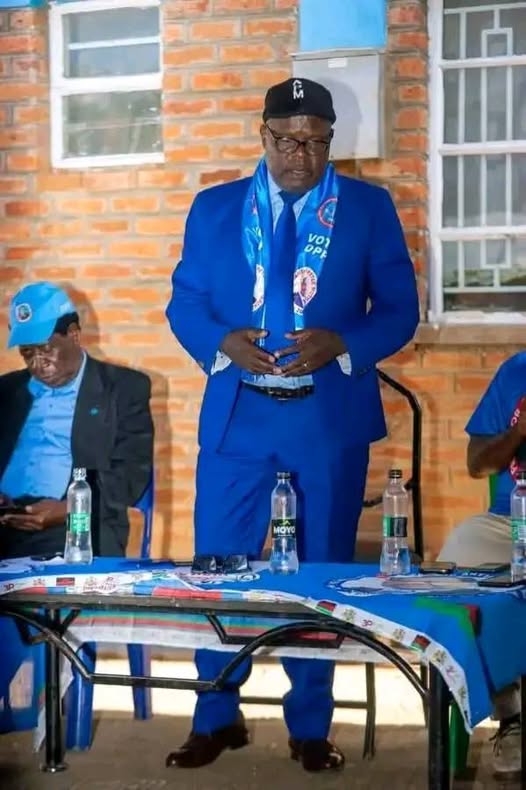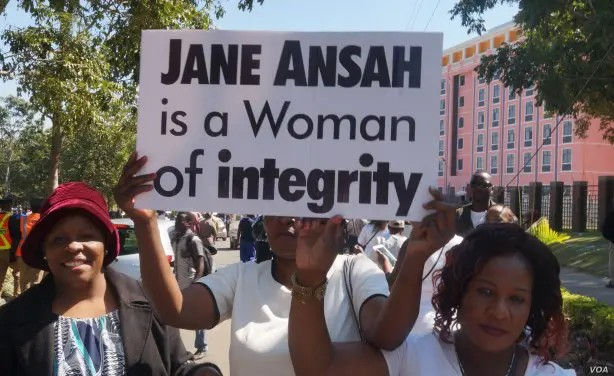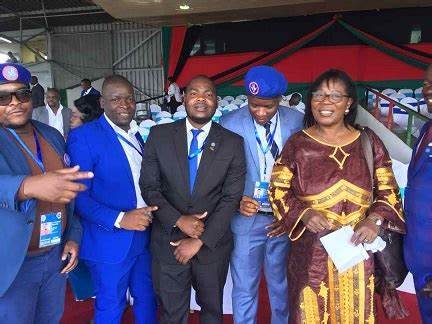In the unpredictable theatre of Malawian politics, few stories carry as much symbolism and irony as the downfall of the former Chairperson of the Malawi Electoral Commission (MEC) Jane Ansah during the Democratic Progressive Party (DPP) parliamentary elections primaries in Ntcheu North East.
Ansah, once a respected Supreme Court justice, became the face of what was infamously dubbed the Tipp-Ex election. And now, once a powerful figure accused of tilting the country’s most disputed 2019 presidential election in favor of the DPP, Ansah has been unceremoniously rejected by the very system she was accused of safeguarding.
Ironically, Ansah embarrassingly suffered the bruising political defeat at the hands of Everton Chimulirenji, the same man whose disputed vice presidency she helped secure in the controversial 2019 elections.

The defeat was in her constituency, but the battle was bigger than a parliamentary seat — it was a contest drenched in historical national betrayal, political debts, and shifting allegiances within a fractured DPP.
Ansah’s name became synonymous with the “Tipp-Ex election” scandal of 2019 and her “Madando” rhetoric which unashamedly she also carried into her primary elections campaign.
As MEC Chair, she presided over an election marred by glaring irregularities, including correction fluid alterations, result sheet tampering, and procedural inconsistencies.
Opposition parties and civil society groups accused Ansah of engineering a victory for then-incumbent President Arthur Peter Mutharika and his running mate Chimulirenji. What was initially declared a DPP triumph was annulled by the Constitutional Court on February 3, 2020 — a historic and humiliating moment for the DPP and for Ansah herself.
Civil society organizations, religious leaders, and the international community joined Malawians in calling out the glaring injustices. The Constitutional Court’s historic February 2020 ruling annulling the election did not only vindicate those cries; it redefined Malawi’s democratic resilience and set a new precedent in African jurisprudence.
But for Jane Ansah, it marked the beginning of a fall from grace so steep it would eventually culminate in last week’s political embarrassment.
Though Ansah maintained her innocence, public trust was irreparably damaged. The protests that followed not only pressured her resignation but also reshaped the national conversation about electoral integrity in Malawi.

Ansah’s decision to enter active politics under the DPP banner was, in many ways, seen as a miscalculation and a betrayal to Malawi as a nation. Perhaps she imagined that her past loyalty would translate into political capital — that the party’s old guard, grateful for the 2019 lifeline she attempted to extend, would rally behind her.
What she misjudged, however, was the nature of DPP’s internal politics, where alliances are transactional, loyalties are fleeting, and yesterday’s kingmakers quickly become expendable.
Chimulirenji, whose own political career had been ridiculed and written off following the 2020 court-ordered election rerun, seized this opportunity. His victory over Ansah is as much a personal redemption as it is a calculated move by a DPP faction eager to distance itself from the toxic legacy of the 2019 elections.
By rejecting Ansah, the DPP is attempting to rewrite history — casting off the architects of its darkest hour in a desperate bid for rehabilitation.
The DPP’s handling of the Ansah-Chimulirenji contest reveals a party still at war with itself.
What Ansah was not aware of Mutharika’s bid for a comeback has left cracks in the DPP, with competing factions jostling for control with Normal Chisale, bodyguard to the former president being the new kingmaker. In such an environment, old alliances are meaningless; survival depends on present utility, not past services rendered.
Ansah’s defeat is a signal to other DPP-aligned figures tainted by the 2019 controversy: the party is shedding its skin. But it may be too little, too late. The DPP cannot outrun the 2019 election debacle — a legacy that continues to haunt its public image and frustrate efforts to rebuild trust.
Jane Ansah’s political humiliation is a classic tale of power’s impermanence. She wielded enormous influence in 2019, stood at the center of a constitutional crisis, and later found herself alienated, publicly scorned, and now rejected by those she once shielded.
Her fall is instructive — a reminder that in Malawian politics, loyalty is never guaranteed, and power secured through controversy is both fragile and short-lived. In aligning herself with the DPP, Ansah tethered her fate to a sinking ship. The party’s rejection of her candidacy is not merely personal; it is symbolic of a broader purge of compromised figures in a party desperate for political survival.
History will likely remember Jane Ansah not for her brief, ill-fated political bid in Ntcheu North East, but for her central, controversial role in one of Malawi’s most consequential elections. That this very controversy was the source of her undoing within the same political fold is the ultimate irony.




